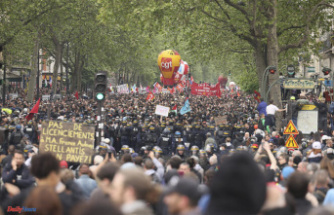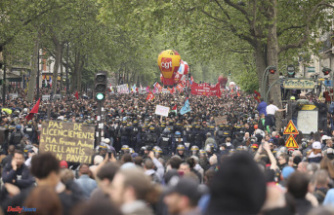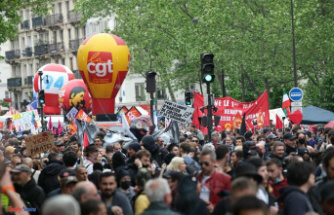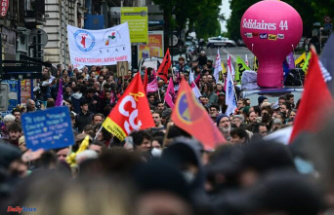The heating season has begun, and many gas customers are already receiving letters about horrendous price increases. The federal government wants to take countermeasures so that households and companies are not overwhelmed. A commission of experts set up by the government presented proposals with a relief volume of around 90 billion euros. The goal: "Safely through the winter". The measures should be a central part of the "defense shield" announced by the traffic light coalition with a volume of up to 200 billion euros. The federal government promises a speedy implementation.
What are the key points of the proposal?
The dramatic increase in natural gas prices threatened to overwhelm the financial capacity of private households and companies, according to the report by the commission with representatives from business, trade unions and science. A two-stage model is proposed. In order to quickly relieve private gas customers and small companies, they should receive a one-off payment in December. From January there should be a price brake for industrial companies, if possible from March, otherwise from April for private households and small companies. At the same time, savings incentives should be retained. Due to a lack of Russian gas supplies, there is a risk of gas shortages in winter. According to the report, security of supply is at risk, so massive savings in natural gas will have to be made.
How is the one-time payment supposed to work?
In order to absorb "extreme" loads from gas and district heating customers, private households and small companies as gas customers should receive a one-time payment in December - based on the consumption on which the down payment from September 2022 was based. This should affect those who are direct customers of a supplier. A point of reference in the past was deliberately chosen so that consumers do not now increase their consumption in order to receive more support, explained the “economic wise man” and co-chair of the commission, Veronika Grimm. "This one-off payment serves as a financial bridge until the regular introduction of the gas price brake," says the report.
According to calculations by the comparison portal Verivox, the average advance payment for a single-family house is currently around 342 euros. If the state takes over an installment, the annual costs would drop from 4108 euros to 3766 euros, which corresponds to a relief of around 8 percent. The state should take over the deductions, the suppliers should get the money reimbursed. In the case of centrally heated apartment buildings, the credit should be passed on from the landlord to the tenants as part of the billing for ancillary costs. In some cases, discounts for tenants have not yet increased, but the landlord is already experiencing higher gas prices. The payment should address “liquidity problems” from landlords.
What should the price brake for private consumers look like?
Wholesale gas prices have skyrocketed. According to the Commission report, a kilowatt hour of gas currently costs an average of 28.3 cents for new customers - a year ago it was 6.8 cents. It is said that private consumers and companies must continue to expect significantly higher gas and district heating prices. "The price increase has considerable social explosive force." That is why there should now be state subsidies for private households and small companies - but the complete price increases should not be cushioned, as the commission made clear. Industry president Siegfried Russwurm, as co-chairman, spoke of a "new normal", which would be well above the price level before the start of the Russian war of aggression in Ukraine, but also well below current prices. There should continue to be incentives to save, in other words: if you heat less in winter, you pay less. The Commission considers it necessary for Germany to save at least 20 percent on gas.
Specifically, there should be a basic quota of 12 cents per kilowatt hour - for 80 percent of the consumption on which the down payment from September 2022 was based. The contractually agreed energy price should apply above this consumption quantity, so it could be very expensive for this remainder depending on the contract. According to the Commission, the gas and heat price brake should come into effect on March 1, 2023, by April at the latest, and it should end at the end of April 2024 at the earliest. There should be an upper limit for the subsidized basic consumption of households.
For district heating customers, there should be a fixed price of 9.5 cents per kilowatt hour for a basic quota of 80 percent. According to Verivox, if basic consumption were capped at 80 percent for a family with a gas consumption of 20,000 kilowatt hours, the costs would drop by 33 percent. Energy expert Thorsten Storck said: "The gas price brake can provide significant relief for households and dampen the heating cost explosion. Nevertheless, households are facing a very expensive winter, because most of the relief will only take effect from next March." The tenants' association commented that the planned basic contingent would noticeably relieve tenant households. The fact that the cap can only take effect from March 2023 for organizational reasons is a downer.
Is that fair?
The proposals met with criticism, mainly because they worked according to the "watering can principle". Commission member and Verdi boss Frank Werneke criticized in a dissenting opinion that the proposed model of the gas price brake was not sufficiently socially balanced. "The model treats a two-bedroom apartment the same way as a villa with a pool. That's why we need additional social hold lines for a fairer model."
The Commission referred to the great time pressure. "If we wanted to be fast, we now had to use watering cans," said co-chairman Michael Vassiliadis, head of the IG BCE energy union. Efforts had been made to design the instrument according to financial strength. But that's not possible. The suppliers do not know whether there is a villa or an apartment building behind a connection. In order to cushion injustice, the price brake discount should be stated in the income tax return as a benefit in kind. The highest possible allowances should apply. An assessment obligation does not arise from the discount alone.
What is planned for the industry?
Many companies are under massive cost and competitive pressure due to the high price increases, said Industry President Russwurm. "For a large and growing number of companies, the threat is existential." The following should also apply to industry: relief and at the same time continue to provide savings incentives. The gas price brake for industrial consumers is to come into force on January 1st. The subsidized quota should be 70 percent of consumption in 2021 - at a procurement price of 7 cents per kilowatt hour.
In addition, there are also duties, levies and taxes, so that in the end, as with private households, an end customer price of 12 cents should be reached. There shouldn't be an upper limit. A company should be able to use the extracted gas for its own purposes or sell it on the market. The subsidy is to be organized through the respective gas supplier, who is to be provided with the necessary financial resources by the state.
For whom should there be hardship provisions?
From the beginning of January to the end of February there should be aid funds to protect tenants and owners, as the commission writes. On the one hand, there should be an interest-free liquidity aid for landlords and housing companies who want to make advance payments for their tenants in the event of extreme price increases for gas and district heating - and on the other hand for tenants who, despite the relief from the rising costs, are still financially overwhelmed.
The relief fund should also apply to tenants and owners who have been affected by price increases for some time. This assistance should exist until the expansion of the housing benefit planned by the federal government takes effect. The Commission also proposes an aid fund for social service providers such as hospitals and care facilities. The Commission's report also includes hardship rules for industry, which include liquidity support, guarantees, grants and loans.
How does it go from here?
Now it's the government's turn. It is unclear whether she will accept the proposal one-to-one. Green leader Omid Nouripour has indicated that the traffic light coalition wants to draw conclusions from the expert commission's proposal on the gas price brake this week. The EU Commission should also have an important say for reasons of competition law. The expert commission itself continues to work on a final report, among other things, open questions should be clarified.
In addition, it is also a matter of examining options for cushioning the price development at European level. The final work results should be available by the end of the month. In addition, the Commission has asked the Federal Government to clarify important points. The best relief mechanism would be to relieve private households and companies through "socially differentiated direct payments", as the report says. However, such an approach is currently not possible because there is no corresponding state infrastructure. The legal basis for this should be created and implemented as quickly as possible.












